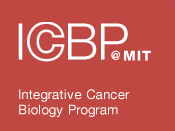| Title | A Mena invasion isoform potentiates EGF-induced carcinoma cell invasion and metastasis. |
| Publication Type | Journal Article |
| Year of Publication | 2008 |
| Authors | Philippar, U, Roussos, ET, Oser, M, Yamaguchi, H, Kim, H-D, Giampieri, S, Wang, Y, Goswami, S, Wyckoff, JB, Lauffenburger, DA, Sahai, E, Condeelis, JS, Gertler, FB |
| Journal | Dev Cell |
| Volume | 15 |
| Issue | 6 |
| Pagination | 813-28 |
| Date Published | 2008 Dec |
| ISSN | 1878-1551 |
| Keywords | Alternative Splicing, Animals, Carcinoma, Cell Movement, Epidermal Growth Factor, Gene Expression Regulation, Neoplastic, Humans, Lung Neoplasms, Macrophages, Mice, Microfilament Proteins, Models, Biological, Neoplasm Invasiveness, Neoplasm Metastasis, Neoplasm Transplantation, Protein Isoforms |
| Abstract | The spread of cancer during metastatic disease requires that tumor cells subvert normal regulatory networks governing cell motility to invade surrounding tissues and migrate toward blood and lymphatic vessels. Enabled (Ena)/vasodilator-stimulated phosphoprotein (VASP) proteins regulate cell motility by controlling the geometry of assembling actin networks. Mena, an Ena/VASP protein, is upregulated in the invasive subpopulation of breast cancer cells. In addition, Mena is alternately spliced to produce an invasion isoform, Mena(INV). Here we show that Mena and Mena(INV) promote carcinoma cell motility and invasiveness in vivo and in vitro, and increase lung metastasis. Mena and Mena(INV) potentiate epidermal growth factor (EGF)-induced membrane protrusion and increase the matrix degradation activity of tumor cells. Interestingly, Mena(INV) is significantly more effective than Mena in driving metastases and sensitizing cells to EGF-dependent invasion and protrusion. Upregulation of Mena(INV) could therefore enable tumor cells to invade in response to otherwise benign EGF stimulus levels. |
| DOI | 10.1016/j.devcel.2008.09.003 |
| Alternate Journal | Dev. Cell |
| PubMed ID | 19081071 |
| PubMed Central ID | PMC2637261 |
| Grant List | 1-U54-CA112967 / CA / NCI NIH HHS / United States CA100324 / CA / NCI NIH HHS / United States GM38511 / GM / NIGMS NIH HHS / United States GM58801 / GM / NIGMS NIH HHS / United States P01 CA100324-01 / CA / NCI NIH HHS / United States R01 GM038511-12 / GM / NIGMS NIH HHS / United States R01 GM058801-01 / GM / NIGMS NIH HHS / United States R01 GM058801-10 / GM / NIGMS NIH HHS / United States U54 CA112967-03 / CA / NCI NIH HHS / United States U54 CA112967-04 / CA / NCI NIH HHS / United States / / Cancer Research UK / United Kingdom |
